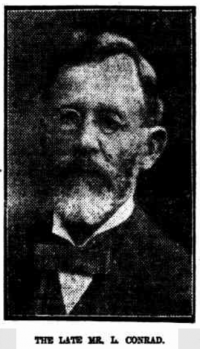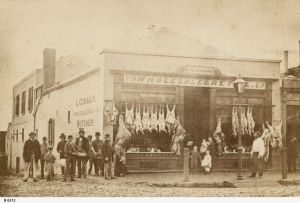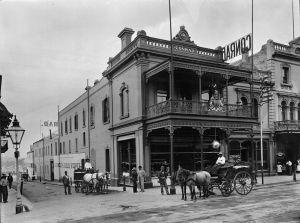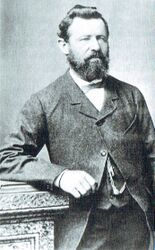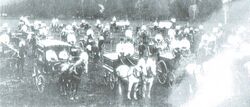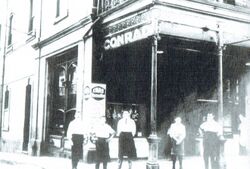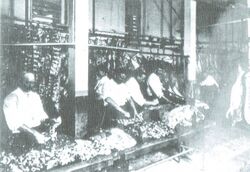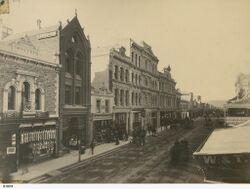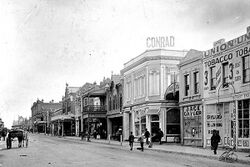Leopold Conrad (1839-1918)
Leopold Conrad (b.1839 Kingdom of Hanover - d. 1918 Adelaide, South Australia) was a butcher and meatworks proprietor in the City of Adelaide from 1863 until his death.
Leopold Conrad | |
|---|---|
Leopold Conrad [Trove article 87554329] | |
| Born | 4 October 1839 Duderstadt, Kingdom of Hanover |
| Died | 17 December 1918 Adelaide, South Australia, Australia |
| Resting place | West Terrace Cemetery, Adelaide, South Australia |
| Nationality |
|
| Occupation | Butcher |
| Spouse(s) |
|
Biography
by Benjamin Hollister. © 2022. All rights reserved. This text may be reproduced with proper attribution of the author.
In Germany
Leopold Conrad was born in the southern Hanoverian town of Duderstadt on October 4, 1838 to Franz Phillip Conrad, a shoemaker, and his wife Wilhelmine Catharine Käsehagen. [1] While Hanover was a Protestant state, Duderstadt, having been part of the personal estate of the Archbishop of Mainz, was primarily Catholic, and the Conrad family subscribed to this denomination. At the age of 13, Leopold was apprenticed to his uncle, Leopold Käsehagen, a butcher in Duderstadt. After three years he was deemed to have completed his training and gained employment as a journeyman in Celle, north-east of the city of Hanover and some 160 kilometres north of Duderstadt.
In 1857, along with his aunt Anna Regina Heuzenröder (née Käsehagen), her husband and children, and three Käsehagen cousins (Carl Phillip, a butcher, Eduard Leopold, a shoemaker, and Leopoldine, nursemaid to the Heuzenröders), Leopold migrated to South Australia aboard the Ohio, arriving in February 1858.
In Australia
Upon arrival in the colony of South Australia, Conrad began employment with George Clark, a butcher in the city of Adelaide, before beginning his own smallgoods manufacture and hawking business from rooms near the Earl of Zetland Hotel in Flinders Street. This location, on the corner of today's Gawler Place and Flinders Street, was very much in the German quarter if Adelaide, as well as near the Catholic church of St Francis Xavier.
In August 1863, at the age of 25, Conrad advertised the opening of his business in Hindley Street, initially at 79 but, with the renumbering of the street, later 88 Hindley Street. This site remained the centre of the Conrad Butchers business until sale in 1925. Initially a single story premise on the corner of Hindley and Victoria streets, eventually Contad owned or leased the the entire eastern frontage of Victoria Street, including meat packing works and cold stores.
Family
Conrad had a deep and complex set of family relationships in South Australia through his ties with Heuzenröder, Käsehagen, and Specht families of Duderstadt.
Related migrants from Duderstadt included:
5 descendants of Phillip Ludwig Käsehagen, shoemaker
- Anna Regina, wife of Carl Heuzenröder - arrived 1858
- Anton Hermann, plumber - arrived 1855
- Children of Leopold
- Carl Phillip, butcher - arrived 1858
- Eduard Leopold, shoemaker - arrived 1858
- Leopoldine Pauline, nursemaid later wife of Wilhelm Specht - arrived 1858
5 children of Anton Heuzenröder
- Carl Joseph Anton Jodocus, pharmacist, husband of Anna Regina Käsehagen - arrived 1855
- Moritz Joseph Hieronymus, pharmacist - arrived 1845
- Hugo Franz Anton Joseph, pharmacist - arrived 1845
- Franz Joseph Theodor Heinrich, pharmacist - arrived 1847
- Wilhelmine Therese Clementine, wife of Wilhelm Eberhard, medical practitioner - arrived 1848
3 brothers of Leopold Conrad (children of Franz Phillip Conrad and Wilhelmine Catharine Käsehagen)
- Eduard, shoemaker - arrived 1860
- Selmar Albert, butcher - arrived 1869
- Louis Francis, butcher - arrived 1872
Wilhelm Specht, railway fitter, later husband of Leopoldine Käsehagen - arrived 1864
The brothers Carl and Hermann Weinrich, railway fitters from Duderstadt who arrived with Wilhelm Specht, were probably also related as Phillip Ludwig Käsehagen married two Weinrich sisters.
In 1863, Leopold married Elizabeth Smith at St Patrick's Catholic Church in Adelaide. The couple had the following children:
| Name | Date of Birth | Date of Death | Spouse |
| Francis Leopold | 20 Jul 1864 Adelaide | abt 1928 New South Wales | Augusta Ann Mary Hines (1886) |
| Ernest August | 17 Nov 1865 Adelaide | 25 Apr 1942 South Australia | Ethel Elizabeth Ann Donald (1893) |
| Selmar Albert | 9 Nov 1867 Adelaide | 26 Oct 1946 South Australia | Alice Miriam Beeton (1912) |
| Wilhemine | 24 Aug 1869 Adelaide | 1954 New Zealand | William Hubert Morton (1892) |
| Elizabeth Gertrude | 23 Jan 1871 Adelaide | 28 Sep 1951 Rose Park | Otto Ziegler (abt 1902) |
| Louis | 22 Sep 1872 Adelaide | 25 Mar 1947 York Western Australia | Mary Winifred Dwyer (1908) |
| Arthur Edward | 30 Apr 1874 Adelaide | 3 Sep 1948 Adelaide | Florence Edith Catchlove (1898) |
| Hannah Valentina | 14 Feb 1879 Adelaide | 16 May 1879 Adelaide | unmarried |
| Francis Herbert (Frank) | 16 Jan 1878 Adelaide | Aug 1935 Manly, New South Wales | Emma Kirby (1917) |
Residences in the City
| Dates | Place | Current Address | Co-ordinates |
|---|---|---|---|
| 5 Aug 1890 - 17 Dec 1918 | "Helston-leigh", East Terrace | 247 East Terrace | -34.932357704579175, 138.61723346161236 |
Work in the City
| Dates | Place | Current Address | Co-ordinates |
|---|---|---|---|
Photo gallery
Published Obituary
From The Register, Wednesday 18 December 1918:
THE LATE MR. L. CONRAD.
A Noteworthy Career.
The death of Mr. Leopold Conrad, in his eightieth year, which occurred at his residence, Helstonleigh, East Terrace, Adelaide, on Tuesday evening, further depletes the fast-vanishing band of men who, having come to Australia in the early years of their lives founded commercial houses which have done much for Australia. The late Mr. Conrad was born on October 4, 1839, in the Kingdom of Hanover, Germany, which, during the reign of King William the Fourth was under British rule, and on the accession of Queen Victoria to the throne in 1836, succeeded to the Duke of Cumberland. Having left Hanover in his nineteenth year, Mr. Conrad arrived in South Australia in February, 1858. Five years afterwards he married Miss Elizabeth Smith, a native of Cornwall, England, and two days later, on August 1, 1863, began business in a small way as a meat salesman in Hindley street. His indomitable courage and business ability laid the foundations of the biggest butchering business in this State — in fact, the largest of its kind controlled by one man in the Commonwealth. Interesting reminiscences are recalled of the early days when Adelaide was a mere village, and trade was solicited in 'a little old fashioned shop ' with a thatched roof, situated on the site now occupied by the extensive works at the corner of Hindley and Victoria streets. In his declining years he handed the management of his business, over to his son, Mr. Arthur E. Conrad. The initial sales of cattle and sheep by auction were begun just prior to the deceased gentleman's entry into business, and cattle were sold at the yards in Stepney, a suburb now closely populated. Sheep and lambs were yarded opposite the Newmarket Hotel, on North Terrace; and, although all traces have disappeared of the venue, sales were continued there until the erection of the Metropolitan Abattoirs. Railways in the fifties were unknown, and beef supplies for Adelaide travelled from far inland. During the 55 years of Mr. Conrad's successful career many and varied fluctuations in prices were recorded. Prime bullocks were purchased at rates ranging from £8 to £40 each, and mutton at prices which, permitted sales at 1d. a lb.
—The Canning Industry.—
Keen business instinct enabled Mr. Conrad to grasp the possibilities of the canning industry, and on the discovery of the Broken Hill mines, and later of the Western Australian goldfields, immense quantities of canned meat were dispatched to the mining centre. Not content with local trade overseas connections were successfully sought and the East Indies, Java, and Japan inhabitants received the packings of the Adelaide house. The Admiralty and War Office also figured on the records of the larger purchasers outside Australia, and great quantities of beef and mutton were treated at the Dry Creek works for the forces. Unfortunately, the geographical position of South Australia was not favourable to the furtherance of an invaluable industry. The installation of cold storage facilities on mail boats and interstate liners and the erection of canning works in New South Wales and Queensland sounded the death knell of an industry which has completely passed into the control of interstate firms.
—An Unassuming Philanthropist.—
It may be truly said of Mr. Conrad that no deserving case calling for philanthropy ever met with a refusal from him. In this direction he ever exercised a practical interest in the welfare of his employees. Like the true philanthropist, he never sought publicity in regard to his acts, and only his beneficiaries and managerial staff were acquainted with his innumerable kindnesses which brightened the lives of his more unfortunate fellowmen. Four years of war witnessed increased calls upon his generosity, and during that period he earned the gratitude of numerous funds and organizations, and the respect and esteem of many returned soldiers for practical help and empathy. Not only from a monetary point was support forthcoming in the fight for freedom. One son, three grandsons, and six nephews bearing his name donned khaki saw service abroad, and three made the supreme sacrifice. Every inducement was offered his employees to enlist on the outbreak of war, and those who survived are assured of their positions on their return to civil life. Business and home life claimed the greater part of his time; consequently he was not prominent in public life, For many years he held office as Councillor and Chairman of the Walkerville District Council and for a term as a member of the Adelaide City Council. Mr Peter Waite was among his most intimate friends, and on being acquainted with his last serious illness, expressed deep regret. 'We were close friends during the last 35 or 40 years," he remarked, "and he appealed to me as one of the most honourable, straightforward, and noble men it has been my good fortune to know."
-A Friendship of 50 Years.-
"I had known Mr. Conrad for the past 50 years," said the Hon. John Lewis, M.L.C.. "Our dealings in stock were on an extensive scale, even in the earlier days, and coupled with most cordial business relations, was a firm friendship. A friendship which stands the test of 50 years is indeed a friendship. Mr. Conrad was an excellent judge of stock, and his quiet, unassuming, manner and straightforward actions in all his dealings won him legions of friends in the commercial world. His word was his bond, and a more honourable man it would have been, impossible to find. His attention was given entirely to his business, and regrets were frequently expressed that he was not more closely associated with public life. Nevertheless he was an ideal colonist, and one whose life reflects to the benefit of his country. One happening some years ago calls to mind his consideration for others, and the concern he felt, if through an action of his, one suffered either mentally or bodily. On this particular occasion I was crossing the street when he accidentally knocked me down with his buggy. Happily no serious consequences attended the accident, but his anxious enquiries for my welfare and the mental pain that slight mishap caused him, served to illustrate the type of man whom all men. admire and respect."
-The Family.—
The deceased has left a widow and an adult family. Messrs. Leo ( Auckland, N.Z.). Ernest (Rose Park), Albert (Glen Osmond), Louis (St Peters), Arthur (Henley Beach), and Frank Conrad (active service, A.I.F.), and Mesdames O. Ziegler (Rose Park) and W. H. Morton (Wellington, N.Z.).[2]
References
- ↑ Specht, Raymond (2009). The flight of The Woodpecker. St. Lucia, Queensland: Raymond Specht. ISBN 978-0-646-50726-2.
- ↑ "The Late Mr. L. Conrad". The Register. Adelaide, South Australia. 18 Dec 1918.
